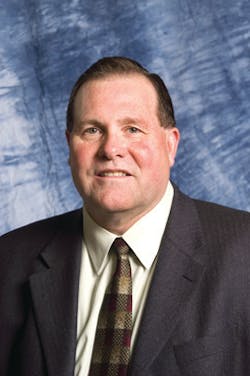Fire Politics: A Political Reality: It's All About Relationships
There is plenty for a fire chief and his or her executive team to do just running the fire department on a day-to-day basis. Dealing with the challenges that accompany the management of personnel, finances, services, programs and activities in the organization, as well as the local politics, can consume all available patience, space and time. This doesn’t even include the desire and need to have something that resembles a personal life away from the department. Bottom line, it’s easy to get caught up in the here and now of running the fire department.
Although daily responsibilities are very important, an overly focused approach can significantly distract you from the need to be a professional leader, being informed and involved, and keeping an eye on what’s happening in the bigger picture that will likely have an impact on your fire department. I am going to address just a few such current issues that are critical and are ripe with political overtones.
Planning
No matter what the current state of your fire department, strategic and operational planning efforts are critical to its future; functionally, politically and from the standpoint of morale. Even in situations where new money is scarce, the professional leader must provide a path forward for the fire department that makes it clear to members and policy-makers that there is a plan in place. In a down economy, it’s tempting for leaders to put the organization on “auto pilot” until times get better with the hope that things will return someday to the way they were before tough times set in. Considering the probability that things aren’t going to be the way they were in the past ever again, this represents a huge failure of leadership and will likely create additional internal and external problems for the chief and others to deal with.
It is so important that the members of the fire department, as well as appointed and elected officials, are confident that the organization is doing all it can to function as effectively and safely as possible given their circumstances and the challenges they face. It’s also critical that the members of the fire department clearly see that the fire chief is communicating the status and needs of the department to those who make the final financial decisions. As hard as it may be, it is the chief’s responsibility to ensure that the department is doing its very best in the present and has a realistic vision and plan for (at least) the near future.
Emergency medicine
Almost all fire departments, whether career or volunteer, are involved to some degree in the delivery of fire service-based EMS. Nationally, the Patient Protection and Affordable Care Act (PPACA) is becoming the law of the land, and when fully implemented, will impact the delivery of pre-hospital 9-1-1 emergency medical care in a variety of ways. Simply put, this will affect local fire departments and their service-delivery systems. Upwards of 80% of the emergency activity of most fire departments will be impacted by the PPACA as it goes into effect. There will be financial opportunities for departments, as well as opportunities to enhance emergency service delivery in a variety of ways.
Professional leaders in fire departments cannot just sit back and wait to deal with what PPACA sends down the road. If that is a fire chief’s approach, he or she is taking the risk that critical opportunities may be lost to their organization in the process. They must take the initiative to become informed about the content of the PPACA, in detail, and get involved in gaining the operational, political and financial support necessary to modify their and response and support systems appropriately.
Preventing an ambush
Fire chiefs cannot possibly have missed recent stories about certain private management consultants ambushing fire departments with biased evaluations they call independent studies. The studies are conducted with the pre-determined goal of cutting the fire department budget. It is not only important that fire chiefs are aware that this is occurring, but they should be conscious of the environment that can make a fire department particularly vulnerable to this type of ambush so that they can act to avoid it. One way to do that is to become informed of factors that were present in cities where these consulting firms approached the policy-makers with a proposal, but were not hired to perform the study.
Often times, the difference between whether they are hired or not is primarily determined by the quality of relationships that exist within the system, including political relationships. These include relationships between the fire chief and elected officials, the union and elected officials and the overall relationship and standing the fire department has in the community. To be fair, there are management consultants who do excellent and objective studies that can be helpful to improving a fire department. However, a fire chief must be well informed of the various factors that could contribute to a less-than-honorable consulting firm being hired. Knowledge and involvement on the part of fire chiefs may minimize the chances of their fire departments being victims of less-than-objective independent management studies.
I could identify other examples, but hopefully these three begin to make the point. Fire department leaders who proactively build positive relationships with policy-makers, including elected officials and other community leaders, provide important avenues for dealing with big-picture issues facing their departments and communities. One of the most effective ways that professional leaders accomplish this is to be involved, engaged and informed concerning trends and issues facing the fire service and their departments. This is not only good leadership and management, but it is also a political reality that significantly impacts organizational success.
For more news and training on fire service politics, visit: http://www.firehouse.com/topics/politics-law.
DENNIS COMPTON, a Firehouse® contributing editor, is a speaker and the author of Progressive Leadership Principles, Concepts and Tools, the When in Doubt, Lead! books, the book Mental Aspects of Performance for Firefighters and Fire Officers, and many articles, chapters and other publications. He was the fire chief in Mesa, AZ, for five years and assistant fire chief in Phoenix, where he served for 27 years. Compton is past chairman of the Executive Board of the International Fire Service Training Association (IFSTA) and past chairman of the Congressional Fire Services Institute’s National Advisory Committee. He is currently chairman of the National Fallen Firefighters Foundation Board of Directors.
About the Author

Dennis Compton
Chief
DENNIS COMPTON is a well-known speaker and the author of several books, including his most recent offering titled Progressive Leadership Principles, Concepts and Tools. He also authored the three-part series of books titled When in Doubt, Lead, the book Mental Aspects of Performance for Firefighters and Fire Officers, as well as many articles, chapters and other publications. Compton was the fire chief in Mesa, AZ, for five years and an assistant fire chief in Phoenix, where he served for 27 years. He is past chairman of the Executive Board of the International Fire Service Training Association (IFSTA) and past chairman of the Congressional Fire Services Institute (CFSI) National Advisory Committee. Compton is currently the chairman of the National Fallen Firefighters Foundation (NFFF) Board of Directors and co-chairs the Fire Service-Based EMS Advocates Steering Committee.
